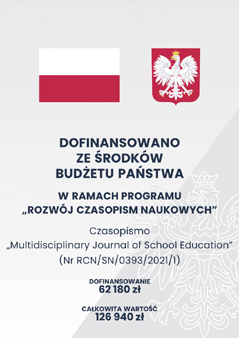Words and Silence in Job Mentoring
Abstract
Today, economic sustainability is a social priority and it implies positive, rewarding, and creative relationships in the workplace. Creativity, innovation, and subjective welfare will remain extremely important for sustainable production models in an age of technological acceleration, ecological threats, and digital globalization. With the impact of the COVID-19 pandemic and the new ways to organize work, this is even more important. The basis for this is to be found in education, especially in secondary and higher education. Good mentoring is becoming essential in professional development; this activity is based on words and silence, using corporate and individual coaching tools to open new doors of creativity. Following Peter Drucker’s (1954) work in management thinking and the approach of positive psychologists, this paper presents a new concept of sustainable working relationships for the 21st century based on words and narratives.
References
Baricco, A. (2019). The Game. Barcelona: Editorial Anagrama.
Boyatzis, R., Smith, M., & Van Oosten, E. (2019). Helping People Change: Ciaching with Compassion for Lifelong Learning and Growth. Boston: Harvard Business Review Press.
Cortina, A. (2009). Ciudadanos del mundo: Hacia una teoría de la ciudadanía. Madrid: Alianza Editorial.
Csikszentmihalyi, M. (1996). Creativity: Flow and the Psychology of Discovery and Invention. New York: HarperPerennial.
Drucker, P. (1954). The Practice of Management. New York: Harper and Collins.
Drucker, P. (2007). Innovation and Entrepreneurship (Practice and Principles). London: Routledge.
Faulkner, M., & Faulkner-Lunsford, M. (2013). Power Verbs for Career Consultants, Coaches and Mentors. New Jersey: Pearson Education.
Friedman, T. (2009). Hot, Flat, and Crowded. New York: Picador/ Farrar, Strauss and Giroux.
Friedman, T. (2016). Thank You for Being Late: An optimist´s Guide to Thriving in the Age of Accelerations. New York: Farrar, Straus and Giroux.
Goleman, D. (1997). Inteligencia Emocional. Barcelona: Editorial Kairos.
Goleman, D. (1998). Working with emotional intelligence. New York: Bantam Books.
Goleman, D. (2013). Focus. Desarrollar la atención para alcanzar la excelencia. Barcelona: Editorial Kairós.
Gonzalez-Alorda, Á. (2011). The talking manager: Leading people through conversations. Barcelona: Alienta Editorial.
Grant, A. (2014). Give and Take. Why helping others drives our success. New York: Penguin.
Ignatius, A. (2018, July-August). Managers don´t have all the answers: A conversation with JP Morgan Chase CEO Jamie Dimon. Harvard Business Review, 8-9.
Jarvis, J. (2009). What Would Google Do? New York: HarperCollins Publishers.
Lefebvre, M., & Redien-Collot, R. (2013). How to Do Things with Words”: The Discursive Dimension of Experiential Learning in Entrepreneurial Mentoring Dyads. Journal of Small Business Management, 370-393.
Marina, J. (2011). Los secretos de la motivación. Barcelona: Editorial Ariel.
McLuhan, M. (1992). The Global Village. Transformation in World Life and Media in the 21st Century. Oxford: Oxford University Press.
Schein, E. (2010). Organizational culture and leadership. San Francisco: Jossey-Bass.
Sennett, R. (2000). La corrosión del carácter. Las consecuencias personales del trabajo en el nuevo capitalismo. Barcelona: Editorial Anagrama.
Stiglitz, J. (2020). People, Power and Profits: Progressive Capitalism for an Age of Discontent. London: Penguin Books.
Stone, D., & Heen, S. (2014, Spring). Difficult Conversations 2.0: Thanks for the Feedback! Rotman Management.
Trost, A. (2016). Below Expectations. Heidelberg: Createspace Independent Pub.
Trost, A. (2017). The End of Performance Appraisal. A Practicioner´s Guide to Alternatives in Agile Organizations. Heidelberg: Springer.
Copyright (c) 2021 Joaquin Solana, Carmen Ruiz-Viñals

This work is licensed under a Creative Commons Attribution-NoDerivatives 4.0 International License.
- The Author/Authors agree(s) to publish the article free of charge in Multidisciplinary Journal of School Education in English or Spanish. The Editorial Board reserves the right to shorten the texts and change the titles.
- As part of free publication mentioned in § 1, the Author/Authors agrees to make the full electronic version of their article available in the Internet.
- The Author/Authors agrees to index their article in databases at home and abroad, including abstracts and keywords as well as Author's/Authors’ affiliation in English and in other languages. The Author/Authors agrees to pass on the information mentioned above to the owners of these databases.
- The Author/Authors declares that their publication is original and does not include borrowings from other works which might cause Publisher's responsibility, does not infringe the rights of the third party and that their copyright on this publication is not limited. The Author/Authors will incur all the costs and will pay compensations which might result from the mendacity of the following statement.
- The Author/Authors declares to bear complete responsibility for the scientific reliability of the article submitted. The detailed contribution of all co-authors is defined.
- The Author/Authors declares to publish the text in the Multidisciplinary Journal of School Education under a Creative Commons Attribution-NoDerivatives 4.0 International License (CC BY-ND 4.0).
- For more than one author, please complete the Authorship Contributions and send it to the editorial office. Please indicate the specific contributions made by each author (list the authors’ initials, e.g., JKH). Please download, complete, scan and attach the file in the system during the submission process.
Authors Statement - Authorship Contributions






